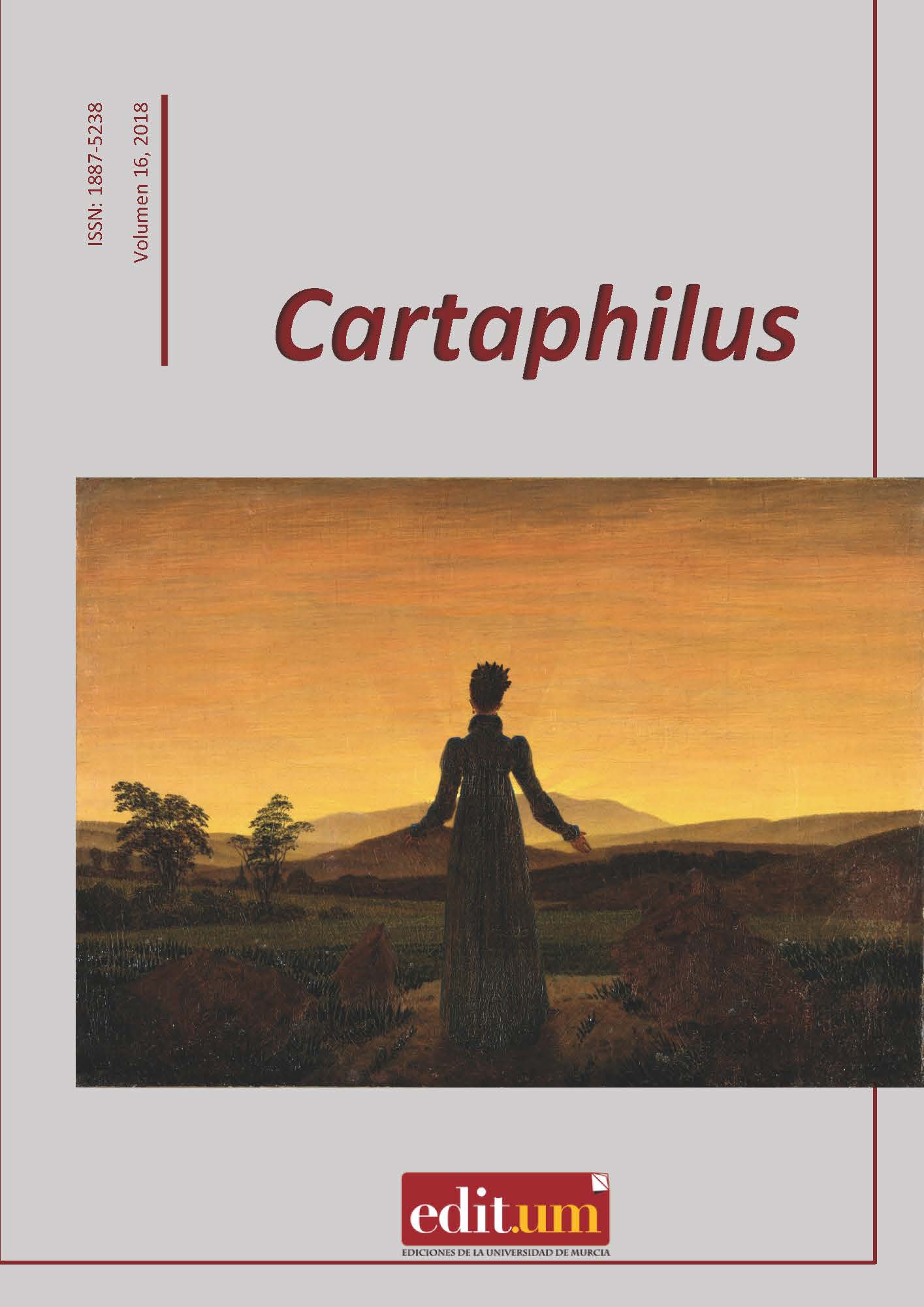Farness beings: the identity and linguistic indefinition as answer to nationalisms in 'Historia argentina'
Abstract
This work tries to draught the position of Rodrigo Fresán in Historia argentina (1991) about nationalism, war and identity through criticism of the references that make up the Argentine. For it, we use Fernando Iwasaki’s reflections about multiculturalism and the relationship between identity hybrid and language, as well as Adan Kovacsics theories about language manipulation in war periods. We suggest, then, to read this work in the light of Las palabras primas (2018), by Iwasaki and Guerra y lenguaje (2007), by Kovacsics, to show the different parodic forms of national identity and the propagandistic language that represents it in the Fresán's work.
Downloads
-
Abstract332
-
pdf (Español (España))391
References
ANDERSON, Benedict (1995): Comunidades imaginadas. Reflexiones sobre el ori- gen y la difusión del nacionalismo. México D.F.: Fondo de Cultura Económica.
BARTHES, Roland (1987): El susurro del lenguaje. Más allá de la palabra y la escri- tura. Barcelona: Paidós.
BAUMAN, Zygmunt (2005): Identidad. Conversaciones con Benedetto Vecchi.Buenos Aires: Losada.
BUJALANCE, Pablo (2018): “Mientras el español no sea la lengua del conocimien- to, dará igual cuántos lo hablen”. Diario de Sevilla. Recuperado de http://www.diariodesevilla.es/ocio/espanol-lengua-conocimiento-igual- hablen_0_1223877769.html.
CASTANY PRADO, Bernat (2015): “Autoderrisión en la obra de Fernando Iwasaki”.Pasavento, Vol. III, nº 2, pp. 147-168.
CASTANY PRADO, Bernat (2016): “El libertinismo identitario en la obra de Fernando Iwasaki”. CAUCE. Revista Internacional de Filología, Comunicación y sus Didácticas, nº 39, pp. 179-194.
CASTANY PRADO, Bernat (2018): “Cómo hacerle el boca a boca a una lengua: Las palabras primas de Fernando Iwasaki”. Pliego Suelto. Revista de Literatura y Alrededores. Recuperado de http://www.pliegosuelto.com/?p=25597.
FRESÁN, Rodrigo (2017): Historia argentina. Barcelona: Penguin Random House.
GARCÍA WONG-KIT, Javier (2014): “Fernando Iwasaki y sus reflexiones sobre identidad, literatura y tecnología”. Descubra a los Nikkei. Emigrantes ja- poneses y sus descendientes. Recuperado de http://www.discovernikkei.org/es/journal/2014/6/30/fernando-iwasaki/.
IWASAKI CAUTI, Fernando (2018): Las palabras primas. Madrid: Páginas de Espuma.
IWASAKI CAUTI, Fernando (2008): rePublicanos. Cuando dejamos de ser realistas (2008). Madrid: Algaba.
IWASAKI CAUTI, Fernando (1988): Nación peruana: entelequia o utopía. Trayectoria de una falacia. Lima: Centro Regional de Estudios Socioeconómicos.
IWASAKI CAUTI, Fernando (2015): “El sapo de la identidad”. El País Semanal, “El Pulso”. Recupera- do de
https://elpais.com/elpais/2015/03/30/eps/1427712980_799198.html.
KOVACSICS, Adan (2007): Guerra y lenguaje. Barcelona: Acantilado. MARCO BAO, Long (2014): “El Macondo pop de Rodrigo Fresán”. Orillas, 3.
MATUTE, Fran (2018): “El máximo halago que se puede hacer a la realidad es convertirla en ficción”. Jot Down Magazine. Recuperado de http://www.jotdown.es/2018/03/rodrigo-fresan-el-maximo-halago-que-
se-le-puede-hacer-a-la-realidad-es-convertirla-en-una-ficcion/.
ROMANO DE THUESEN, Evelia (2000): “Literatura y lenguaje en la narrativa ar- gentina de la década de 1990: el ejemplo de Rodrigo Fresán”, en SEVILLA, Florencio y ALVAR, Carlos (eds.): Actas del XIII Congreso de la Asociación In- ternacional de Hispanistas. Madrid: Biblioteca Virtual Miguel de Cervan- tes.
STEINER, George (2006): Lenguaje y silencio. Ensayos sobre la literatura, el len- guaje y lo inhumano. Barcelona: Gedisa.
TOLOZA, Fernando (2004): “Fernando Iwasaki: «La patria de un escritor son sus libros y sus lecturas»”. La capital, Año CXXXVII, Nº 48592. Recuperado de http://archivo.lacapital.com.ar/2004/12/05/seniales/noticia_154561.sht ml.
Works published in this journal are subject to the following terms:
1. The Servicio de Publicaciones of the University of Murcia (the publisher) reserves the copyright of the published works and encourages and allows their reuse under the usage licence indicated in point
© Servicio de Publicaciones, Universidad de Murcia, 2015
2. Works are published in the electronic edition of the journal under a Creative Commons Reconocimiento-NoComercial-SinObraDerivada 4.0 International licence (legal text). They may be copied, used, disseminated, transmitted and publicly displayed, on condition that: i) the author and original source of the publication are cited (journal, publisher and URL of the work); ii) the material is not used for commercial purposes; iii) the existence and specifications of this licence for use are mentioned.

3. Self-archiving conditions We allow and encourage authors to electronically disseminate the preprint versions (the pre-review version) and/or post print (the version that has been reviewed and accepted for publication) of their works before they are published as this encourages earlier circulation and dissemination and so a potential increase in their citation and impact in the academic community.




